Curated OER
The Peanut Wizard
Peanuts inspire this lesson about George Washington Carver, called The Peanut Wizard in the included informational text. Class members read about peanuts and George Washington Carver and create a timeline of his life. In addition, pupils...
Curated OER
Just Lookin' For a Home
What is a boll weevil? Your class can find out that and more by following the activities included here. Pupils read an article, sing a boll weevil song, add to the song with their own original lyrics, illustrate the song, study the...
Read Works
Read Works: Fourth Grade: Three Lesson Unit: Cause and Effect
[Free Registration/Login Required] A three-lesson unit on cause and effect where students learn signal words to identify cause and effect relationships and then examine those relationships in historical fiction with Pink and Say by...
Beacon Learning Center
Beacon Learning Center: What Caused It?: Student Web Lesson
Students are asked to be detectives while they read and to look for the cause/effect sentences in the paragraphs. In this lesson, students read paragraphs and answer questions about it by either typing in their responses or selecting...
University of South Florida
Fcat Express: Selective Underlining
Site provides extensive assistance in preparing 4th grade students for Florida Comprehensive Assessment Test. This section focuses on identifying main ideas and significant details by selectively underlining them in a text.
University of South Florida
Fcat Reading Grade 4: Teaching Strategies
This is a great resource that concentrates strategies and student activities in one place in an easy to use format, and can be navigated easily. Find great examples of probable passage, selective underlining, and semantic feature...
University of South Florida
Fcat Express: Cause and Effect
Site provides extensive assistance in preparing 4th grade students for Florida Comprehensive Assessment Test. This section helps students identify cause and effect in literature.
Read Works
Read Works: Passages: The Noisiest Cat
[Free Registration/Login Required] Students read a fiction text about a girl and her pet cat and answer questions about comprehension, conflict, supporting details, main idea, and more. Links to a paired text and paired text questions...
Read Works
Read Works: Passages: Forgetting the Words
[Free Registration/Login Required] Students read a fiction text about a boy named Andy who has a part in the school play and answer questions about comprehension, conflict, inferencing, main idea, literary devices, and more. Links to a...
Read Works
Read Works: Passages: Lessons From Fishing
[Free Registration/Login Required] Students read a fiction text about a boy named Morgan who loved to fish and answer questions about comprehension, comparing details, supporting details, main idea, vocabulary, and more. Links to a...
Utah Education Network
Uen: Third Grade Writing Lesson #1/ Descriptive Prompt
Given a descriptive writing prompt, 3rd graders will include precise word choices and sensory language in a piece of writing about their favorite place.
Read Works
Read Works: Lesson: Cause and Effect
[Free Registration/Login Required] Using the book "When I Grow Up", this lesson plan aids students in learning about cause and effect relationships and the words that signify them.
Read Works
Read Works: Lesson: Author's Purpose: Cause and Effect Signal Words
[Free Registration/Login Required] With this lesson plan, students can learn how several authors can write about the same topic, but for different purposes.
Teachers.net
Teachers.net: The Gingerbread Man
Introduce your primary students to retelling and sequencing skills. Will also help move your students to higher-level thinking which deals with characters, setting, and plot. Site offers one week's worth of lessons.
Read Works
Read Works: Lesson 2: First and Last Sentences (Passage)
[Free Registration/Login Required] Students comprehension will be reinforced as they reading first and last sentences of paragraphs. Direct teaching, guided practice, and independent worksheets are available for this third grade lesson.
Better Lesson
Better Lesson: Text Feature Diagrams
At the end of this instructional activity, students will be able to identify and create diagrams associated with informational text. Included is a link to an eSpark video on diagrams, rules for group work, multiple examples of diagrams,...
CPALMS
Cpalms: Compare/contrast Life Cycle Texts
[Free Registration/Login Required] Students will learn to compare and contrast texts about life cycles using a Venn diagram. Then, using the Venn diagram, students will write an expository paragraph including an introductory sentence,...
Capital Community College Foundation
Guide to Grammar and Writing: Diagramming Sentences Power Point
This handy PowerPoint presentation introduces the concept of sentence diagramming. It includes a number of examples.
Scholastic
Scholastic: So That's the Reason! [Pdf]
Simple, one-page printable worksheet to introduce your students to cause and effect. Gives one set example, and has space at the bottom to apply to any story you read.
Writing Fix
Writing Fix: Show What Your Mind Sees
This writing activity asks writers to make use of both showing and telling as they create a well-organized paragraph of description. After reviewing showing versus telling by building a writer's notebook page, each writer will show what...
Writing Fix
Writing Fix: A Picture Book Writing Lesson: Start With What Isn't There
In this lesson plan, learners will describe a setting, attempting to set a mood for their readers in two paragraphs. Borrowing a technique from Stephen Kramer's two-page introduction to Caves, they will begin with a paragraph that...
Curated OER
Mc Graw Hill: Part 2 Reading: Informational Text: Connections Within Text
Learn how information in a text can be connected through compare and contrast, cause and effect, and sequence.
Curated OER
Mc Graw Hill: Part 2 Reading: Informational Text: Cause and Effect Text Structure
Cause and Effect is a text organization structure and knowing this structure can help you in comprehending a text. Learn about these strategies on this site.
Curated OER
Mc Graw Hill: 4th Grade Use Details and Examples
When reading a story learn how to recall specific examples from the text to answer comprehension questions. In addition, you can also use story details to make inferences.




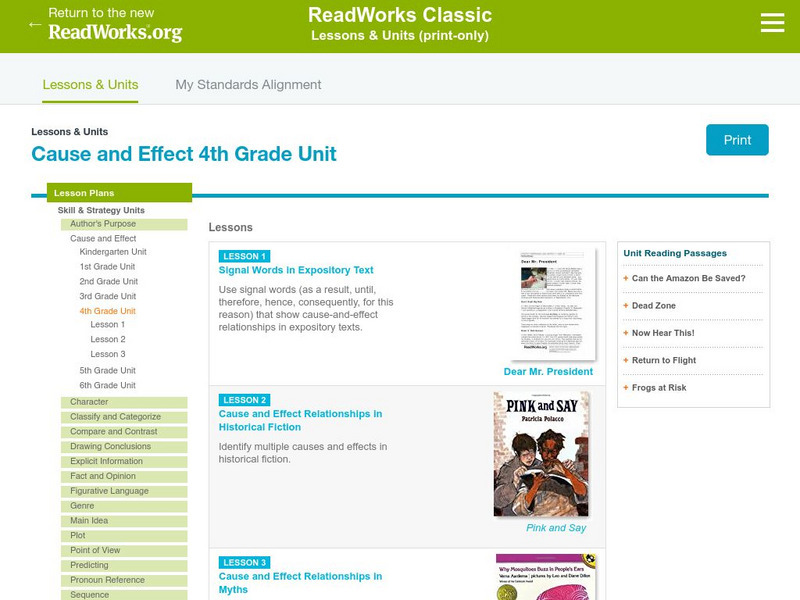
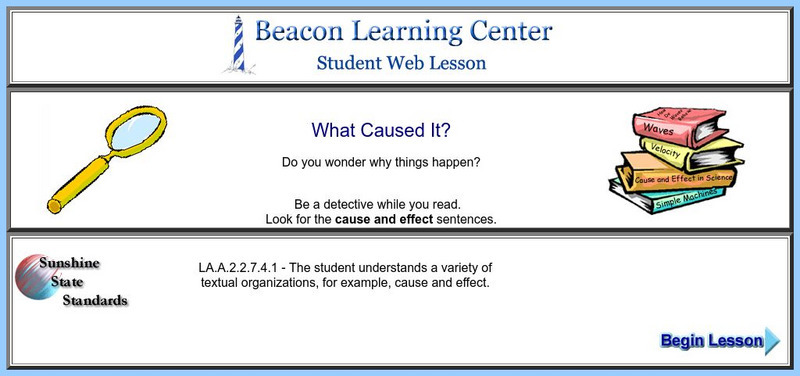
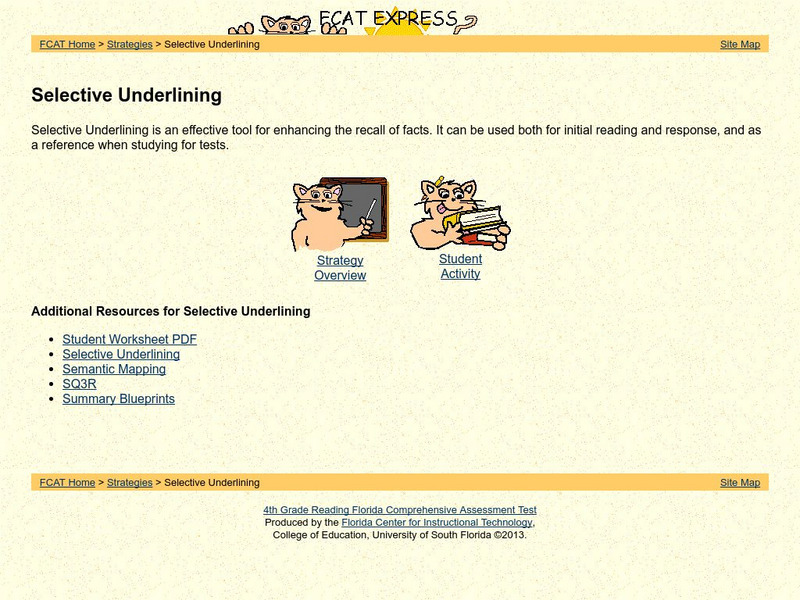
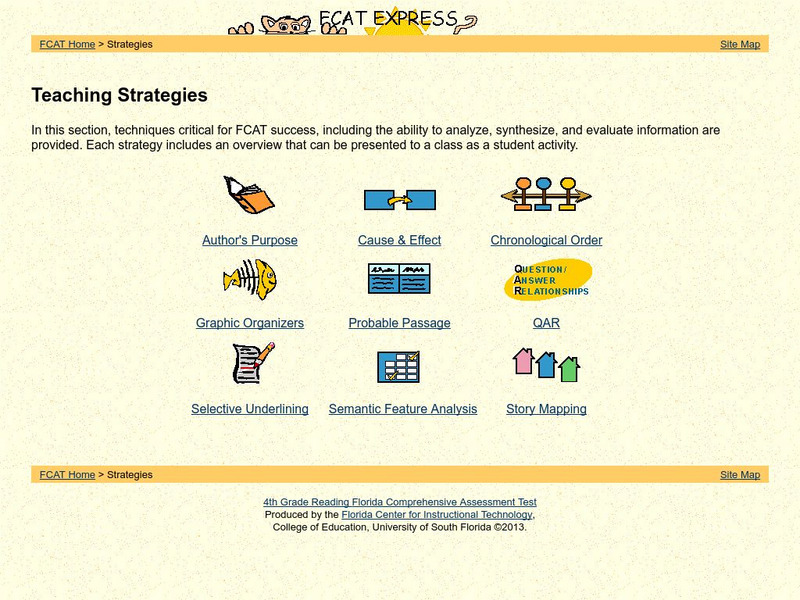

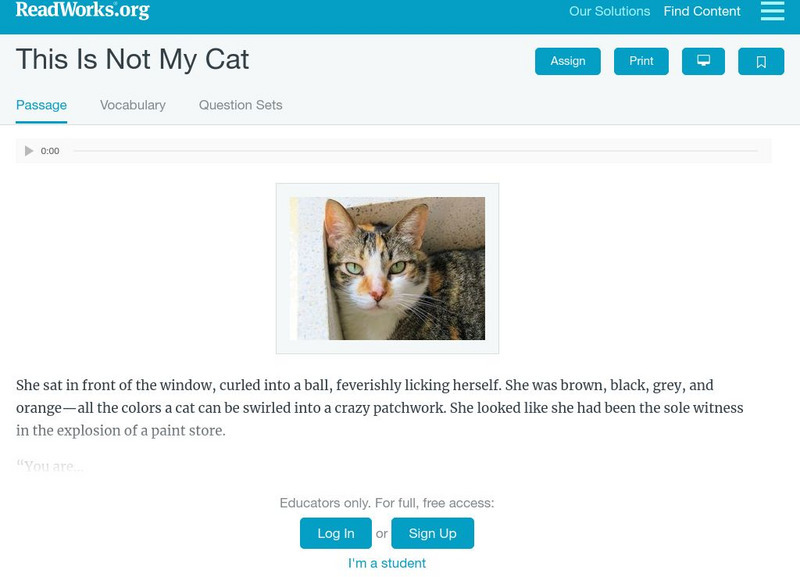

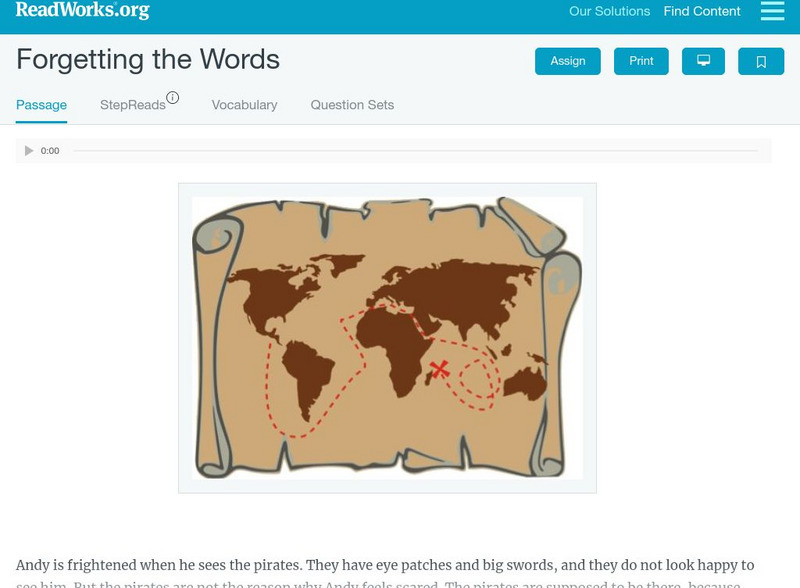

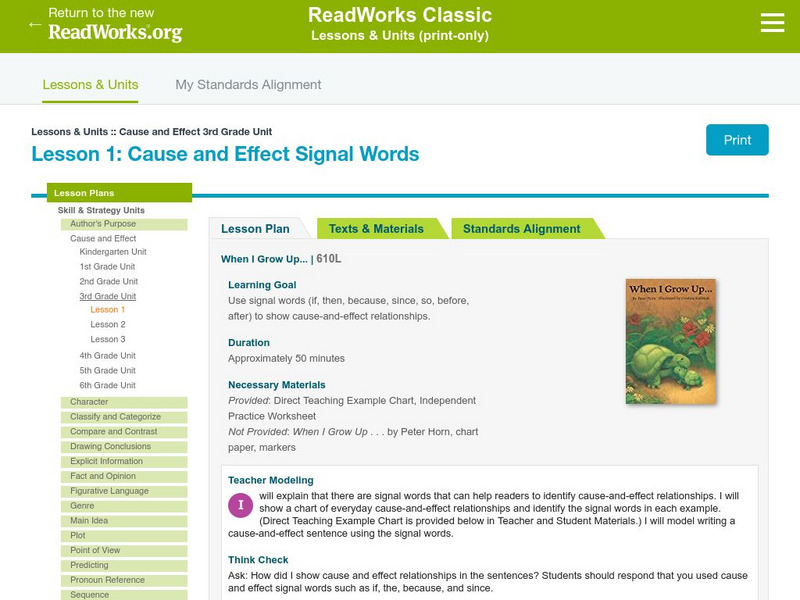





![Scholastic: So That's the Reason! [Pdf] Unknown Type Scholastic: So That's the Reason! [Pdf] Unknown Type](https://content.lessonplanet.com/knovation/original/32238-436f863b7c91b994bd9fe2e7c4a03769.jpg?1661264711)



